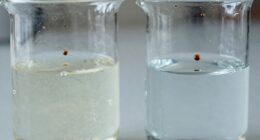Antioxidants in coffee, like phenolic acids, flavonoids, and melanoidins, help protect your body by neutralizing free radicals that can cause cell damage. They support your overall health by fighting oxidative stress, which is linked to aging and various diseases. The levels of these antioxidants can vary based on roasting and brewing methods. Keep exploring to discover how these compounds can boost your well-being and how to maximize their benefits.
Key Takeaways
- Coffee antioxidants like phenolic acids and melanoidins neutralize free radicals, reducing cellular damage.
- They support overall health by protecting against oxidative stress linked to aging and chronic diseases.
- Chlorogenic acids, the main phenolic antioxidants, lower inflammation and may decrease cardiovascular risk.
- The antioxidant content varies with roasting and brewing methods, affecting health benefits.
- Analytical techniques like UHPLC-Q-Orbitrap assess antioxidant composition and bioaccessibility for health impact insights.

Coffee is rich in bioactive compounds, with over 136 identified substances that offer health benefits. Among these, antioxidants play a crucial role in supporting your health, and they’re primarily made up of phenolic acids, flavonoids, and melanoidins. These bioactive compounds work together to combat oxidative stress by neutralizing free radicals—unstable molecules that damage cells and contribute to aging and disease.
Coffee contains over 136 bioactive compounds, including antioxidants like phenolic acids, flavonoids, and melanoidins that combat oxidative stress.
When you enjoy your coffee, you’re not just getting a caffeine boost; you’re also ingesting a potent source of antioxidants that help protect your body at a cellular level.
Chlorogenic acids are the most abundant phenolic antioxidants in coffee, markedly contributing to its health benefits. They’re powerful compounds that can reduce inflammation, support your immune system, and potentially lower the risk of chronic illnesses such as cardiovascular disease and type 2 diabetes.
The antioxidant content of coffee, however, isn’t static—it varies depending on several factors. For instance, the roasting level influences the antioxidant profile: lighter roasts tend to preserve more phenolic acids and flavonoids, while darker roasts develop more melanoidins, which also have antioxidant properties.
Similarly, the brewing method plays a role; methods like pour-over or espresso extraction can affect how many antioxidants are extracted into your cup.
The origin of the coffee beans and cultivation practices also impact the levels of antioxidants present. Beans grown in different regions or under varying conditions can contain different concentrations of bioactive compounds.
Advanced analytical techniques, such as UHPLC-Q-Orbitrap HRMS, help scientists profile these antioxidants in detail and determine their bioaccessibility after digestion. That means they can assess how well these compounds are absorbed and utilized by your body once you drink coffee.
Frequently Asked Questions
What Do Antioxidants in Coffee Do?
You might wonder what antioxidants in coffee do. They fight off free radicals, which can damage your cells and accelerate aging.
By neutralizing these harmful molecules, antioxidants help protect your DNA, proteins, and fats. This support boosts your immune system, reduces inflammation, and may lower your risk for chronic diseases like heart issues, cancer, and neurodegenerative conditions.
Drinking coffee regularly can be a tasty way to support your overall health.
What Do Antioxidants Actually Do?
Antioxidants help you by neutralizing free radicals, which are unstable molecules that can damage your cells. When you consume antioxidants, they protect your DNA, proteins, and fats from oxidation, reducing your risk of chronic diseases like heart disease, cancer, and neurodegenerative conditions.
What Is the Antioxidant Effect of Caffeine?
You might wonder about caffeine’s antioxidant effect. When you consume coffee, caffeine acts as a powerful antioxidant by neutralizing free radicals that can cause cellular damage. It fights oxidative stress, which is linked to aging and disease.
Is It Good to Drink Antioxidants Every Day?
You might wonder if drinking antioxidants daily is good. The answer is yes, in moderation.
Consuming antioxidant-rich coffee every day can help protect your cells, reduce inflammation, and lower your risk of chronic illnesses.
Just keep your intake within recommended caffeine limits—about 400 mg per day.
Incorporating it into a balanced diet supports your overall health, but avoid excessive consumption to prevent side effects like insomnia or increased heart rate.
Conclusion
You now know that antioxidants in coffee help protect your cells from damage and support your overall health. By enjoying your daily cup, you’re giving your body valuable compounds that fight inflammation and boost your well-being. Remember, moderation is key, but incorporating coffee into your routine can be a simple way to benefit from its natural antioxidants. So, savor your coffee knowing it’s doing good things for your body with each sip.









